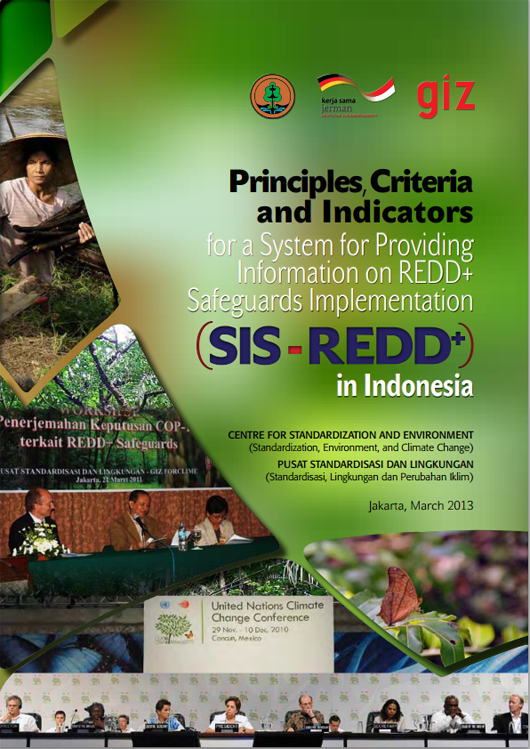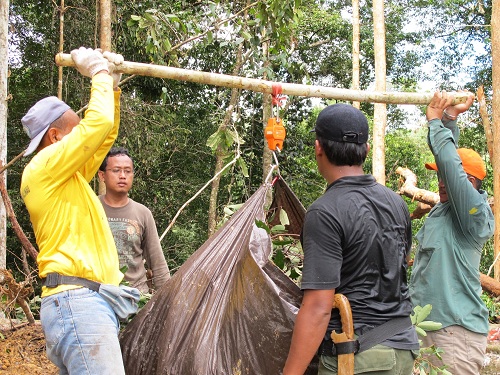FORCLIME
Forests and Climate Change ProgrammeTechnical Cooperation (TC Module)

Select your language

FORCLIME supports communities in their application and preparation for Community Based Forest Management (CBFM) with the aim of facilitating their legal access to forest resources, building their capacities for sustainable forest management and diversifying their sources of income so as to improve their livelihoods. These activities also serve as pilots for the Forest Management Units who in the future will be expected to facilitate and assist communities with CBFM development in their area.
In collaboration with the district forest services FORCLIME has comprehensively supported the process of CBFM development in two villages, Setulang in Malinau District (5.300 ha) and Manua Sadap (1.600 ha) in Kapuas Hulu District together with other partners such as the regional Watershed Management Agency (BP-DAS) and NGOs like Flora Fauna International and Perkumpulan Kaban. As a first step and based on information about the different CBFM options, the communities selected the CBFM scheme that seemed most appropriate for them, in both cases this was Village Forest (Hutan Desa). During the period of 2010-2012, facilitation activities in the two villages included development of a Village Forest Proposal, training and mentoring to strengthen the village forest management organization, and training for legal drafting. FORCLIME supported participatory village boundary mapping, field verification of the village forest area and a participatory inventory of potential non-timber forest products. Capacity building included skills on how to assess and register the quantities and qualities of available forest resources and how to prepare a sound sustainable forest management plan. Moreover, trainings were conducted on the utilisation and processing of selected non-timber forest or agroforestry products such as honey and coconut oil. The forest management institutions have been formed in the villages and are currently awaiting the work permit for the village forest working area from the Ministry of Forestry.
Additionally, to strengthen the facilitating services from the District Forestry Office with regard to village forest development, a series of study tours has been undertaken to Jambi, Yogyakarta and West Sumatra, in addition to training for village forest facilitators from the Forest Service of Malinau. Currently, a study is conducted to review the curriculum and training modules for village forest facilitators in order to improve the training materials so that in the future they will more suitable for needs in the field.
Further activities to be followed up include: (a) Participatory forest inventory in the forest of Manua Sadap village, (b) Preparation of the work plan for Village Forests in Setulang and Manua Sadap, after the village forest working area is established, (c) Submission of the proposal of village forest management to the Governor, (d) Strengthening the capacity on CBFM for the forestry extension staff and NGOs, (e) Facilitating the development of community-level forestry enterprises (honey, gaharu, rattan), (f) Replicating the development of CBFM in other villages in Malinau , Berau and Kapuas Hulu districts in the framework of the Forest Management Units.
The capacity building measures have empowered the communities to make their village forest applications in line with the sometimes complex administrative procedures. They are now in a better position to manage their forests in a sustainable way and derive benefits for their livelihood improvement. The district forest services have been able to draw on experiences also from other regions in Indonesia and benefitted from a learning-by-doing approach in handling the administrative processes which are still new to all stakeholders involved.
For further information, please contact:
Ali Mustofa, Thematic Leader of Community Empowerment
Tunggul Butarbutar, Strategic Area Manager of FMU development

From 2011 until today FORCLIME has supported the Center for Standardisation and Environment of the Ministry of Forestry in setting up an Information System on REDD+ Safeguards Implementation as agreed by the Conference of Parties to the UNFCCC at their 16th session in Cancun in 2010.
The process began with a national stakeholder workshop in March 2011 to identify safeguards instruments and policies in use in the forest sector in Indonesia and to discuss their strengths and weaknesses. Instruments presented included both mandatory safeguards tools and procedures such as Environmental Impact Assessment (EIA) or the mandatory SFM certification as well as voluntary initiatives such as forest certification standards or high conservation value forest assessment. Of these existing safeguards instruments seven were later analysed in depth with regard to their relevance and suitability as REDD+ safeguards and the results validated. Based on the analysis a set of principles, criteria and indicators were derived to serve as a measuring tool for safeguards implementation in REDD+. The analysis and extraction of principles, criteria and indicators was carried out through a series of Focus Group Discussions with ressource persons from both governmental, civil society, private sector and research organisations with technical support from Daemeter Consulting. Moreover, the series of Focus Group Discussions conducted in 2011 and 2012 also generated proposals for the structure, information flow and functioning of the REDD+ Safeguards Information System. In the beginning of 2013 a tool for the self-assessment and reporting on safeguards implementation by REDD+ activity proponents has been created. The next step in the process is to develop a prototype database and web-platform by which information on REDD+ safeguards implementation will be provided to interested stakeholders. FORCLIME will further support trials of the system at the provincial level.
For more information contact:
At FORCLIME: Rayan Mohammad: Mohammad.Rayan@giz.de
At the Centre for Standardization and Environment: Novi Widyaningtyas: novia_widya@yahoo.com
Or download relevant publications from our media and publications page such as
Principles, Criteria and Indicators for a System for Providing Information on REDD+ Safeguards Implementation (SIS-REDD+) in Indonesia. Centre for Standardization and Environment, Ministry of Forestry, and Forests and Climate Change Programme, Deutsche Gesellschaft für Internationale Zusammenarbeit, 2013.
Or consult the Website of the Centre for Standardization and Environment, Ministry of Forestry: www.staneclime.org

Improving higher accuracy of carbon stock assessment is one of main activities at FORCLIME project areas within the REDD+ readiness activity. This will not only developing and testing methodologies, but also to generate accurate estimation of emission factor, which later on will be used to develop Reference (Emission) Level (RL/REL). Currently, there is scarcity of accurate local allometric equations for East and West Kalimantan. Existing research at Balai Besar Penelitian Dipterokarpa-B2PD) on carbon and biomass allometric equations have been conducted for dipterocarp species. Additional data on tree biomass is required to generate more accurate allometric equations especially for non dipterocarp species.
In collaboration with B2PD and timber concessions in East Kalimantan, deastructive samplings were conducted to collect tree biomass data. First field campaign was conducted in cooperation with PT Inhutani I Pimping Managenet Unit from the period of 4th – 16th March 2012. Total of 10 sample trees were felt and weighted in the field. Wood, branch, twig and leaf samples were taken to laboratory at Mulawarman University for dry weight analysis. We then continued the field campaign on 4th- 11th April 2012, at PT Inhutani I Kunyit-Simendurut Management Unit to compile 10 sample trees more from various non-dipterocarp species and diameter classes. Samples were also taken to the same laboratorium for dry weight analysis. The next field measurement was conducted on 22nd - 30th April, at PT Intracawood Manufacturing, Tarakan. We successfully cutted down, measured and weighted 18 sample trees at current year cutting blocks. Total of 38 sample trees have been felt, measured and weighted in the field. Four of them, are more than 100 cm in dbh.
While we are waiting for the results from the laboratorium, another field campaign is planned for Kapuas Hulu, West Kalimantan, in which FORCLIME project area located. It is proposed to cut some non dipterocarp trees from this area to validate wheter the equation developed from East Kalimantan stillcan be used at West Kalimantan. A coordination with district forestry service and timber concessions is being conducted. Based on these data sets, we will publish the equation in an international scientific journal to ensure the validity and gain scientific justification through peer reviews from experts and scientists.
For more information please contact:
Solichin Manuri
Forest Carbon Advisor at GIZ-FORCLIME
solichin.solichin@giz.de
Fatmi Noor’an
Researcher at B2PD
fatmi_b2pd@yahoo.com
 |
Supported By: |
  |